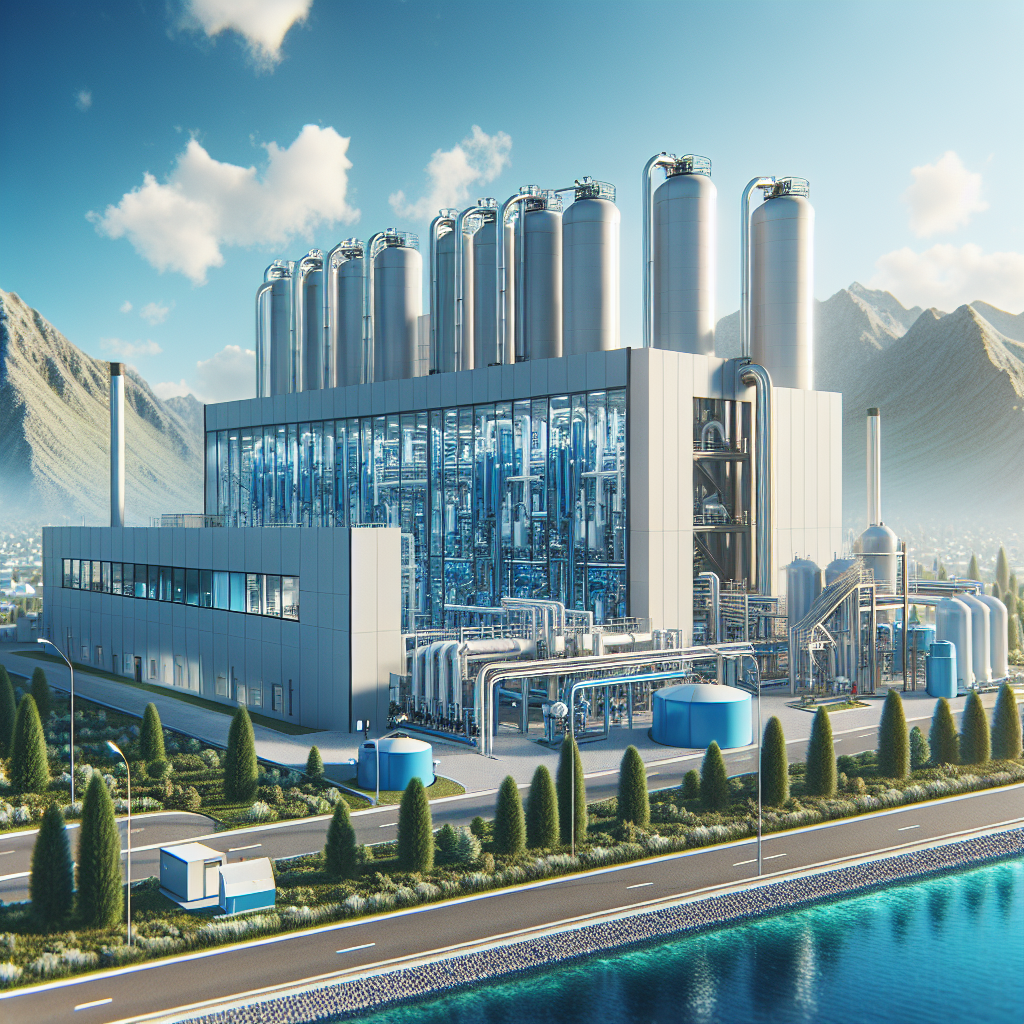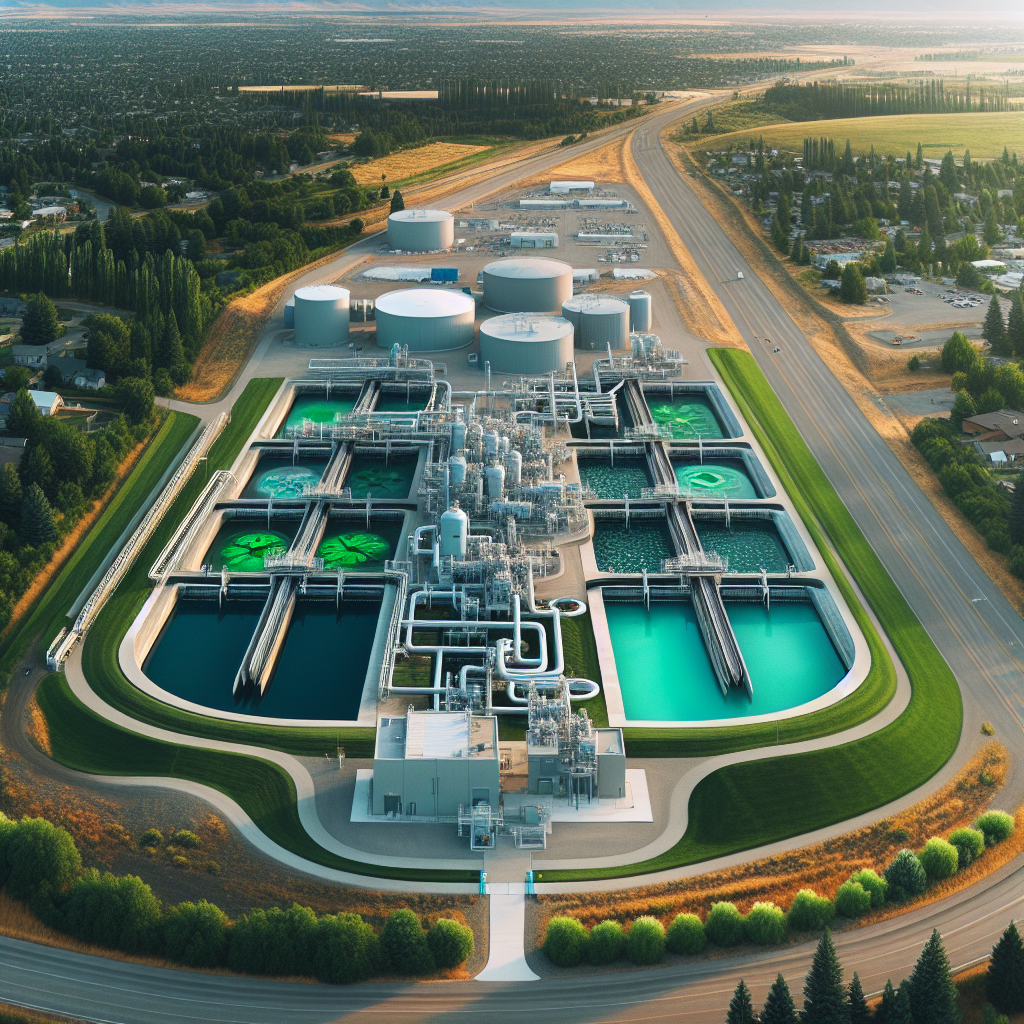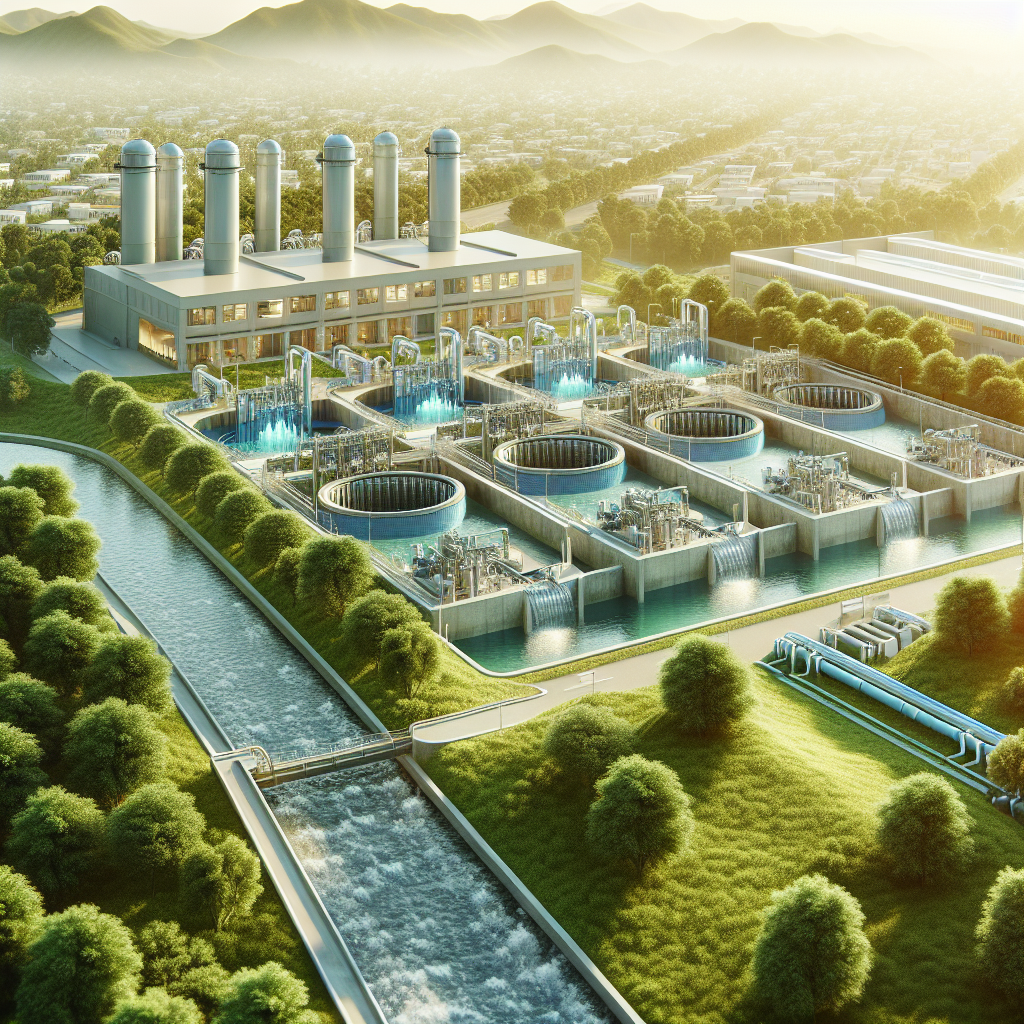Inside One of America\’s Most Advanced Water Reclamation Facilities

Inside One of America’s Most Advanced Water Reclamation Facilities
Introduction
Welcome to the world of Clark County water reclamation, where innovation meets necessity in the heart of Nevada! If you’ve ever wondered how a desert community tackles the challenge of water scarcity, look no further than this advanced water reclamation facility. Here, wastewater is transformed into a valuable resource, turning what once was a problem into a sustainable solution.
In Clark County, where glitzy Las Vegas shines under the sun, the need for effective wastewater management is more crucial than ever. As urbanization continues to soar, so does the demand for clean water. This facility isn’t just a sewage treatment plant; it’s a beacon of hope for eco-friendly practices and innovative technologies that ensure public health and safety.
From advanced filtration systems to community outreach programs promoting conservation, this facility exemplifies how sustainable water solutions can be implemented on a grand scale. Join us as we delve deeper into the inner workings of this remarkable facility and discover how it plays an essential role in shaping the future of water quality management in Clark County.
Overview of Clark County Water Reclamation Facility
The Clark County Water Reclamation Facility is not just a sewage treatment plant; it’s a shining example of modern wastewater management in Clark County, Nevada. Located strategically to serve the bustling Las Vegas area, this facility plays a crucial role in ensuring that the region’s water supply remains sustainable and clean.
Established in the late 1990s, the facility has undergone significant upgrades and expansions to meet the growing demands of the community. With an eye towards innovation, it has become a benchmark for eco-friendly water practices in Clark County.
Did you know? The facility processes over 100 million gallons of wastewater daily, turning it into reclaimed water that can be reused for irrigation and industrial purposes!
Key Features and Technologies Used
This state-of-the-art facility employs advanced filtration systems for water reclamation that are designed to maximize efficiency while minimizing environmental impact. Some of its standout features include:
- Advanced Filtration Systems: Utilizing cutting-edge technologies like membrane bioreactors and reverse osmosis, the facility ensures high-quality effluent management strategies.
- Sustainable Water Solutions: The facility focuses on innovative water reuse technologies that support drought-resistant landscaping initiatives throughout Clark County.
- Public Health and Safety: Stringent regulatory compliance measures are in place to guarantee that treated wastewater meets or exceeds safety standards before being released back into the environment.
The Evolution of Wastewater Infrastructure
The journey of the Clark County Water Reclamation Facility reflects broader trends in wastewater management across the nation. As municipalities face increasing pressure from population growth and climate change, facilities like this one are leading the charge towards more sustainable solutions. This includes not just treating wastewater but also engaging with local communities through outreach programs aimed at promoting water conservation.
The future looks bright for wastewater management in Clark County as this facility continues to innovate and adapt. With its commitment to sustainability and community engagement, it stands as a model for other municipalities aiming to enhance their own wastewater infrastructure.
Wastewater Management in Clark County
When you think of Clark County, images of the dazzling Las Vegas Strip might come to mind, but behind the glitz and glamour lies a robust wastewater management system that ensures the region remains sustainable and environmentally friendly. The Clark County water reclamation efforts are crucial in maintaining public health and safety while also conserving precious water resources.
Current Wastewater Treatment Processes
The wastewater treatment process in Clark County is nothing short of impressive. Utilizing advanced technologies, the county’s facilities treat an average of over 200 million gallons of wastewater each day. This process includes:
- Preliminary Treatment: Removing large debris and grit.
- Primary Treatment: Allowing solids to settle out.
- Secondary Treatment: Biological processes that break down organic matter.
- Tertiary Treatment: Advanced filtration systems that polish the water for reuse.
Importance of Effective Wastewater Management
A well-managed wastewater system is vital for several reasons:
- Public Health: Prevents contamination of drinking water sources.
- Environmental Protection: Reduces pollution entering local waterways.
- Resource Conservation: Reclaims water for irrigation and industrial use, promoting sustainability.
Challenges Faced by the Municipality
No system is without its hurdles. In Clark County, some challenges include:
- Drought Conditions: The ongoing drought in Nevada puts pressure on water resources, making conservation efforts more critical than ever.
- Aging Infrastructure: Upgrading old pipes and treatment facilities to meet modern standards can be costly and time-consuming.
- Community Engagement: Educating residents about the importance of wastewater management and encouraging participation in conservation programs can be a tough sell.
The benefits of effective wastewater management extend beyond just treating sewage; they play a pivotal role in urban planning and sustainable development throughout the Las Vegas area. The integration of reclaimed water usage into landscaping projects not only conserves drinking water but also enhances community aesthetics!
Sustainable Water Solutions in Clark County
When it comes to sustainable water solutions, Clark County is leading the charge like a superhero in a cape made of recycled water. The innovative practices implemented at the Clark County water reclamation facility are not just about treating wastewater; they’re about transforming it into a resource that benefits the entire community.
Eco-Friendly Practices Implemented at the Facility
The facility employs cutting-edge technologies that minimize environmental impact while maximizing efficiency. From advanced filtration systems to energy-efficient operations, every step in the wastewater management in Clark County is designed with sustainability in mind. Imagine turning what used to be a burden into a boon for public health and safety!
The Role of Reclaimed Water Usage in Sustainability Efforts
Reclaimed water is like that friend who always brings snacks to the party everyone loves it, and it’s incredibly useful! In Clark County, reclaimed water is not just for irrigation; it’s also being used for industrial processes, helping reduce the demand on potable water supplies. This innovative approach supports both economic growth and environmental stewardship.
Drought-Resistant Landscaping Initiatives Using Reclaimed Water
With Nevada’s penchant for desert landscapes, drought-resistant landscaping has become essential. By utilizing reclaimed water from the sewage treatment plant Clark County, residents can cultivate lush gardens without guzzling down precious drinking water. Think of it as giving Mother Nature a helping hand while also keeping your yard looking fabulous!
Did You Know? The use of reclaimed water for landscaping not only conserves drinking water but also reduces stormwater runoff, making it a win-win situation for both urban planning and sustainable development.
Community Engagement and Education
The success of these eco-friendly initiatives hinges on community involvement. Through educational programs and outreach efforts by Clark County environmental services, residents are encouraged to adopt sustainable practices. This collaboration fosters a culture of conservation where everyone can contribute to protecting this vital resource.
In conclusion, sustainable water solutions in Clark County are not just about managing resources; they’re about creating a resilient future. By embracing innovative technologies and community engagement, Clark County is setting an example for municipalities everywhere on how to make wastewater work wonders!
Advanced Filtration Systems for Water Reclamation
When it comes to Clark County water reclamation, advanced filtration systems are the unsung heroes, quietly working behind the scenes to transform murky wastewater into crystal-clear reclaimed water. Think of these systems as the ultimate makeover artists, taking something that most people would rather avoid and turning it into a valuable resource.
Description of Filtration Technologies Employed
The facility employs a variety of cutting-edge filtration technologies, including:
- Membrane Bioreactors (MBR): Combining biological treatment with membrane filtration, MBRs effectively remove suspended solids and pathogens, ensuring high-quality effluent.
- Reverse Osmosis (RO): This technology pushes water through semi-permeable membranes, filtering out impurities and producing some of the purest reclaimed water available.
- Granular Activated Carbon (GAC) Filtration: GAC systems adsorb organic compounds and contaminants, enhancing the overall quality of treated wastewater.
Benefits of Advanced Filtration in Water Quality Management
The benefits of these advanced filtration systems are manifold:
- Enhanced Water Quality: The rigorous purification process ensures that reclaimed water meets or exceeds safety standards for various uses.
- Increased Efficiency: These systems allow for higher flow rates and lower operational costs compared to traditional methods.
- Reduced Environmental Impact: By recycling wastewater, we minimize the need for freshwater extraction from natural sources, promoting sustainable practices in Clark County.
Comparison with Traditional Treatment Methods
Let’s break down how advanced filtration stacks up against traditional treatment methods:
| Treatment Method | Efficiency | Water Quality Output | Environmental Impact |
|---|---|---|---|
| Traditional Treatment | Moderate | Adequate for certain uses but may require further treatment | Higher due to freshwater dependency |
| Advanced Filtration Systems | High | Suitable for a wide range of applications including irrigation and industrial use | Lower due to effective recycling practices |
The future is bright for wastewater management in Clark County. With these innovative technologies paving the way, municipalities can ensure that they are not just treating sewage but actively contributing to a more sustainable ecosystem. So next time you hear about the Clark County sewage system, remember that it’s not just about waste it’s about reclaiming resources and protecting our precious environment!
If you’re involved in municipal water reclamation projects or simply interested in eco-friendly practices, consider exploring how advanced filtration can be integrated into your strategies. Let’s make every drop count!
Treated Wastewater Benefits and Usage
When you think of treated wastewater, you might picture something less than glamorous. But let’s clear the air or rather, the water! The Clark County Water Reclamation Facility is turning this perception on its head with a variety of innovative applications that are not only beneficial but essential to the community.
Applications of Treated Wastewater in the Community
Treated wastewater isn’t just for flushing toilets; it’s a versatile resource! Here are some exciting ways it’s being used:
- Irrigation: Parks, golf courses, and even residential landscaping benefit from reclaimed water, promoting lush greenery without straining our freshwater resources.
- Industrial Uses: Factories utilize treated wastewater for cooling processes and other operational needs, saving costs while minimizing environmental impact.
- Construction: Dust control and soil compaction during construction projects often employ treated water, showcasing its utility in urban development.
Economic Advantages for Municipalities and Residents
The economic benefits of using treated wastewater are as clear as a sunny day in Nevada:
- Cost Savings: By reducing reliance on potable water for non-drinking purposes, municipalities can significantly lower their water bills.
- Job Creation: The infrastructure required for effective wastewater management leads to local job opportunities in engineering, maintenance, and environmental services.
- Sustainable Development: Utilizing reclaimed water supports sustainable urban planning initiatives that align with Clark County’s broader environmental goals.
Public Health and Safety Considerations in Treated Wastewater Usage
You might wonder about safety. After all, we’re talking about sewage here! The good news is that strict regulations govern the use of reclaimed water. Here’s how safety is prioritized:
- Advanced Filtration Systems: These systems ensure that contaminants are removed effectively before the water is reused.
- Regular Testing: Continuous monitoring of water quality guarantees compliance with health standards set by regulatory bodies in Nevada.
- User Education: Community outreach programs inform residents about safe practices when using reclaimed water for irrigation or other purposes.
The benefits of treated wastewater extend beyond just conserving resources; they embody a forward-thinking approach to sustainability. As we move towards more eco-friendly practices in Clark County, embracing reclaimed water usage is not just smart it’s essential!
Regulatory Compliance for Wastewater Treatment in Nevada
Navigating the labyrinth of regulations governing wastewater treatment can feel like trying to find a parking spot on the Las Vegas Strip challenging, but absolutely essential. In Nevada, particularly within Clark County, regulatory compliance for wastewater treatment is not just a box to check; it’s a cornerstone of public health and environmental safety.
- Overview of Regulations: The state mandates strict adherence to the Clean Water Act, which sets forth standards for water quality management. These regulations ensure that facilities like the Clark County Water Reclamation Facility maintain high treatment standards to protect both the community and the environment.
- Compliance Measures: The facility employs cutting-edge technologies and operational strategies to meet or exceed regulatory requirements. This includes advanced filtration systems that enhance effluent quality and innovative water reuse technologies that promote sustainability.
- Impact on Operations: Compliance isn’t just about ticking boxes; it drives innovation. For instance, the need for effective effluent management strategies has led to the development of cost-effective wastewater solutions tailored specifically for Clark County’s unique challenges, such as its arid climate and rapid population growth.
The facility also engages in proactive community outreach, educating residents about the importance of regulatory compliance in protecting public health and safety. This is crucial in fostering trust and ensuring that everyone understands how treated wastewater can be safely reused.
A well-regulated facility not only protects public health but also enhances community resilience against droughts through sustainable practices like reclaimed water usage. This is especially pertinent in a region like Clark County, where water scarcity is a pressing concern.
In summary, regulatory compliance for wastewater treatment in Nevada is about much more than following rules it’s about safeguarding our communities while paving the way for innovative solutions in wastewater management. As we look towards future municipal water reclamation projects, understanding these regulations will be key to success.
Community Outreach for Water Conservation in Clark County
When it comes to clark county water reclamation, community engagement is not just a nice-to-have; it’s a must-have! The Clark County Environmental Services Department has rolled out several initiatives aimed at fostering a culture of water conservation among residents and businesses alike. Here’s how they’re making waves:
- Educational Programs on Water Conservation: The facility conducts workshops and seminars aimed at teaching the community about the importance of water conservation. These programs cover everything from basic water-saving tips for households to advanced concepts like the benefits of recycled water.
- Engagement with Local Communities: Through partnerships with schools and local organizations, the facility actively engages with various community groups. This grassroots approach helps to spread awareness about the water recycling process and its critical role in sustainable development.
- Promoting Innovative Water Reuse Technologies: By showcasing cutting-edge technologies in their outreach efforts, such as advanced filtration systems for water reclamation, they inspire residents to adopt eco-friendly practices. This includes everything from using reclaimed water for irrigation to implementing stormwater management strategies that benefit both homes and businesses.
The impact of these outreach efforts can be substantial. Not only do they help reduce overall water consumption, but they also foster a sense of community responsibility towards managing our precious resources. After all, when it comes to sustainable water solutions in Clark County, every drop counts!
Key Takeaway: Community outreach is essential for effective wastewater management in Clark County. By educating residents about the benefits of reclaimed water usage and innovative technologies, we can collectively work towards a more sustainable future.
- Educational programs on water conservation
- Engagement with local communities
- Promoting innovative water reuse technologies
article blockquote,article ol li,article p,article ul li{font-family:inherit;font-size:18px}.featuredimage{height:300px;overflow:hidden;position:relative;margin-top:20px;margin-bottom:20px}.featuredimage img{width:100%;height:100%;top:50%;left:50%;object-fit:cover;position:absolute;transform:translate(-50%,-50%)}article p{line-height:30px}article ol li,article ul li{line-height:30px;margin-bottom:15px}article blockquote{border-left:4px solid #ccc;font-style:italic;background-color:#f8f9fa;padding:20px;border-radius:5px;margin:15px 10px}article div.info-box{background-color:#fff9db;padding:20px;border-radius:5px;margin:15px 0;border:1px solid #efe496}article table{margin:15px 0;padding:10px;border:1px solid #ccc}article div.info-box p{margin-bottom:0;margin-top:0}article span.highlight{background-color:#f8f9fb;padding:2px 5px;border-radius:5px}article div.info-box span.highlight{background:0 0!important;padding:0;border-radius:0}article img{max-width:100%;margin:20px 0}






